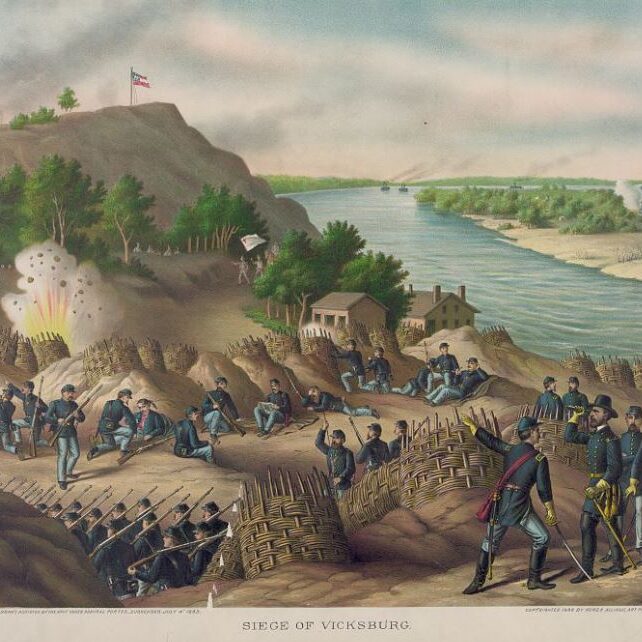The Siege of Vicksburg was a pivotal moment in the Civil War, with both the Union and Confederacy recognizing its strategic importance.
From the significance of the Union victory at Vicksburg to the lasting legacy of this historic event, we delve into why Vicksburg was the turning point of the Civil War. We explore the events leading up to the siege, the tactics used during the siege, and the ultimate impact it had on the outcome of the war.
- 1. What Led to the Siege of Vicksburg?
- 2. The Importance of Vicksburg for the Confederacy
- 3. Why Did the Union Target Vicksburg?
- 4. The Siege of Vicksburg Begins
- 5. What Tactics Did the Union Army Use in the Siege of Vicksburg?
- 6. The Momentum Shift During the Siege
- 7. The Confederate Surrender at Vicksburg
- 8. How Did the Siege of Vicksburg Affect the Overall Outcome of the Civil War?
- 9. The Legacy of Vicksburg: A Turning Point in the War
- 10. Frequently Asked Questions about the Siege of Vicksburg
- Further Heading
1. What Led to the Siege of Vicksburg?
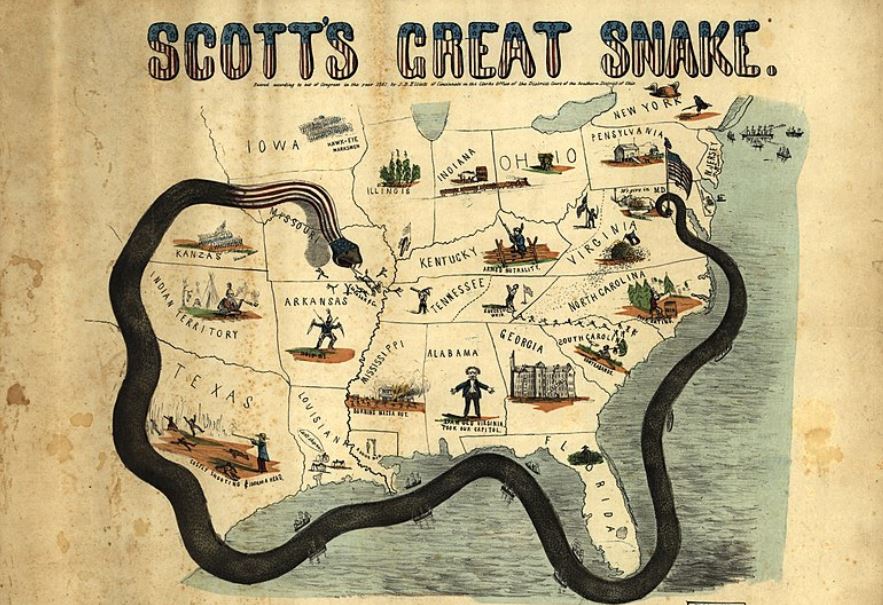
Vicksburg, Mississippi, wasn’t just another Southern city during the Civil War. Perched high on the Mississippi River’s east bank, it was a critical Confederate stronghold.
Its capture became a central goal for the Union’s “Anaconda Plan” to strangle the Confederacy by controlling the Mississippi.
But before the brutal siege that unfolded in 1863, a series of key events set the stage for this dramatic clash.
- December 1862 – The Battle of Holly Springs: Union General Ulysses S. Grant launched his first Vicksburg campaign, aiming to bypass the city and capture strategic rail lines. However, a daring Confederate raid led by Earl Van Dorn destroyed vital Union supplies at Holly Springs, forcing Grant to retreat.
- March – April 1863 – Grant’s Second Attempt: Undeterred, Grant devised a new strategy. He planned a multi-pronged attack, with one force under William T. Sherman feinting north while Grant’s main army crossed the Mississippi River south of Vicksburg. Meanwhile, another Union force under John A. McClernand would attack from the north.
- April – May 1863 – Union Victories and the Confederate Retreat: Grant’s meticulously planned operation unfolded with precision. Union victories at Port Gibson, Raymond, Jackson, Champion Hill, and Big Black River Bridge pushed Confederate Lieutenant General John C. Pemberton’s army back towards Vicksburg. Realizing he was trapped, Pemberton retreated within the city’s well-fortified defenses.
By May 18, 1863, the stage was set for the siege. Grant, unwilling to risk another costly frontal assault, decided to surround Vicksburg and squeeze the life out of the Confederate defenders. The dramatic 47-day siege that followed would become a turning point in the Civil War.
2. The Importance of Vicksburg for the Confederacy
For the Confederacy, Vicksburg held immense strategic value, making its defense a critical priority.
The Lifeline of the Mississippi
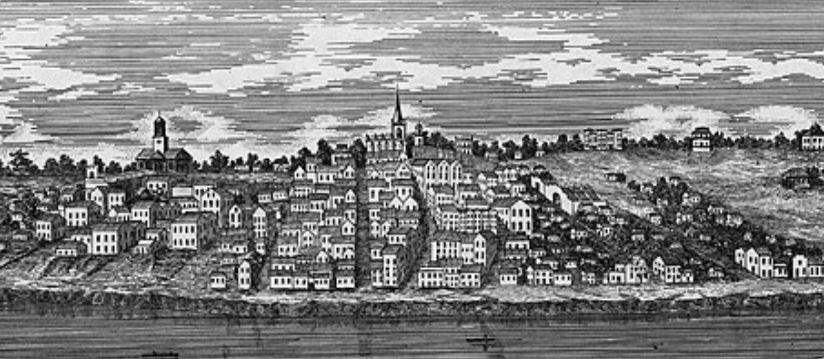
The Mississippi River served as the Confederacy’s main artery.
It allowed for the transport of troops, supplies, and crucial war materials between the eastern and western states.
Vicksburg, perched high on the river’s east bank, acted as a powerful guardian, controlling this vital waterway.
By holding Vicksburg, the Confederacy could hinder Union movement and maintain communication across its territory.
A Gateway to the West
Vicksburg’s location wasn’t just about river traffic. It was also a gateway to the resource-rich states of Texas, Arkansas, and Louisiana.
These areas provided the Confederacy with food, livestock, and even some manpower.
The loss of Vicksburg would isolate these western states, crippling the Confederacy’s ability to wage war effectively.
A Symbol of Confederate Strength
Beyond its strategic advantages, Vicksburg became a symbol of Confederate defiance.
With its formidable fortifications and determined defenders, Vicksburg embodied the South’s resistance. Losing Vicksburg would be a major blow to Confederate morale, not just for the troops but for the civilian population as well.
Committed Leadership
The Confederate leadership recognized Vicksburg’s importance and entrusted its defense to Lt. Gen. John C. Pemberton.
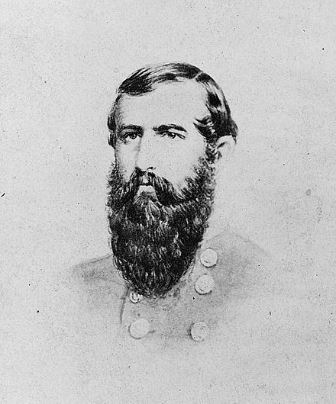
Pemberton, a skilled engineer, oversaw the city’s fortifications and believed they were impregnable.
However, Pemberton’s shortcomings as a field commander would come to light during the siege.
Despite his limitations, Pemberton’s unwavering commitment to holding Vicksburg reflected the desperate lengths the Confederacy was willing to go to in order to retain control of the Mississippi River.
3. Why Did the Union Target Vicksburg?
Vicksburg wasn’t just a Confederate stronghold; it was a thorn in the Union’s side throughout the Civil War. But why exactly did the Union prioritize capturing this particular city?
The Anaconda Plan and Grant’s Tenacity
Early in the war, the Union devised the Anaconda Plan, a strategic approach championed by General Winfield Scott.
This plan involved blockading Southern ports and gaining control of the Mississippi River, effectively splitting the Confederacy in two and crippling its ability to transport supplies and troops.
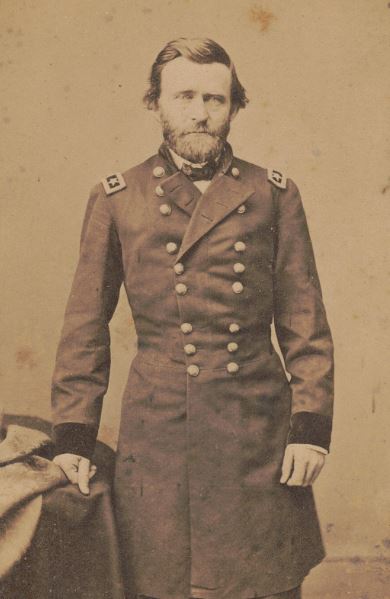
President Abraham Lincoln understood the importance of this plan, and Ulysses S. Grant, a rising star among Union commanders, embraced it wholeheartedly.
Vicksburg, situated high on the Mississippi, was a crucial piece of this puzzle for Grant. Capturing it would sever the Confederacy’s east-west lifeline and significantly hinder their war effort.
Crippling the Confederacy’s Economy
The Mississippi River was a military highway and important trade route for the Confederacy.
Lincoln and his advisors understood this economic dependence. By taking Vicksburg, the Union could disrupt this trade, depriving the Confederacy of a vital source of revenue and crippling their ability to finance the war.
Boosting Union Morale
The Civil War dragged on, a seemingly endless quagmire that devoured lives and tested the patience of the Northern populace.
Public support for the war had begun to wane, and President Abraham Lincoln, acutely aware of this diminishing sentiment, recognized that a victory at Vicksburg was more than just a strategic win.
It would be a critical morale booster for the Union, a much-needed display of the North’s growing strength and unwavering determination to see the war through to victory.
4. The Siege of Vicksburg Begins
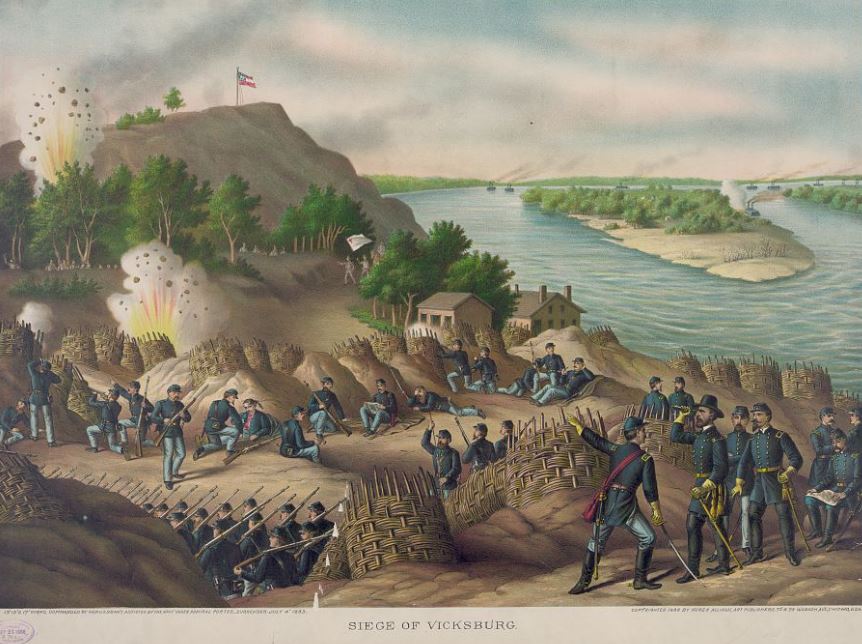
By May 1863, Grant’s initial attempts to capture Vicksburg through swift assaults had proven costly failures. Faced with mounting casualties and Confederate resilience, Grant was forced to adapt.
On May 25th, the brutal siege of Vicksburg began.
Union soldiers entrenched themselves around the city, constructing a series of earthworks that gradually strangled the Confederate hold.
Shelling from artillery batteries became a constant menace, raining down on Confederate positions and wreaking havoc on civilian infrastructure.
Supply lines for the Confederates dwindled, and desperate measures were taken to feed the trapped soldiers and civilians.
The siege exposed the limitations of Vicksburg’s defenses. While formidable fortifications could withstand a direct assault, they weren’t designed to sustain a prolonged siege with limited resources.
As the days bled into weeks, the true test of Vicksburg’s endurance, and the will of its defenders, had only just begun.
5. What Tactics Did the Union Army Use in the Siege of Vicksburg?
During the brutal siege of Vicksburg, the Union Army employed a combination of tactics to wear down the Confederate defenders:
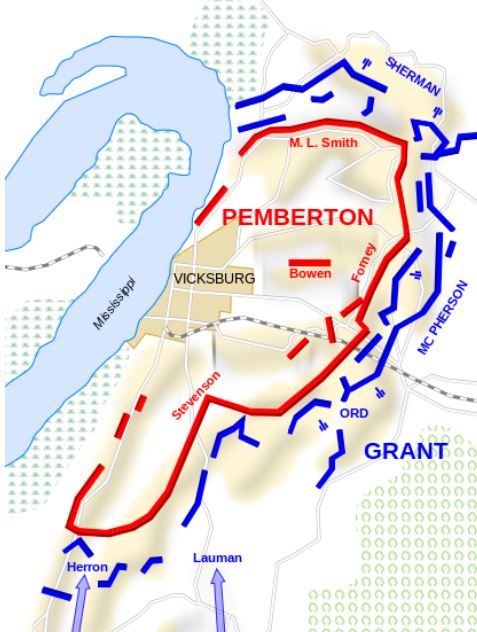
- Encirclement and Trench Warfare: This was the backbone of the siege strategy. Union troops meticulously constructed a series of trenches and earthworks around Vicksburg, effectively encircling the city and cutting off any escape routes or potential reinforcements. This tactic slowly compressed Confederate territory and restricted their ability to maneuver.
- Artillery Barrage: Union artillery batteries pounded Vicksburg relentlessly. The constant bombardment served several purposes: damaging Confederate fortifications, inflicting casualties on defenders, and most importantly, demoralizing both soldiers and civilians trapped within the city. The relentless shelling created a constant state of fear and anxiety, weakening the will to resist.
- Mining: The Union Army attempted to use underground tunnels packed with explosives to breach Confederate defenses. While one such attempt failed (the June 25th mine explosion), it kept the Confederates on edge and forced them to dedicate resources to countering this threat.
- Psychological Pressure: The siege itself served as a form of psychological warfare. Trapped within the city with dwindling supplies and constant bombardment, the morale of Confederate troops and civilians began to deteriorate. Union forces sometimes used tactics like playing music loudly at night to further disrupt sleep and heighten anxiety within the besieged city.
These combined tactics, focused on attrition and demoralization, proved successful in forcing the Confederate surrender of Vicksburg.
6. The Momentum Shift During the Siege
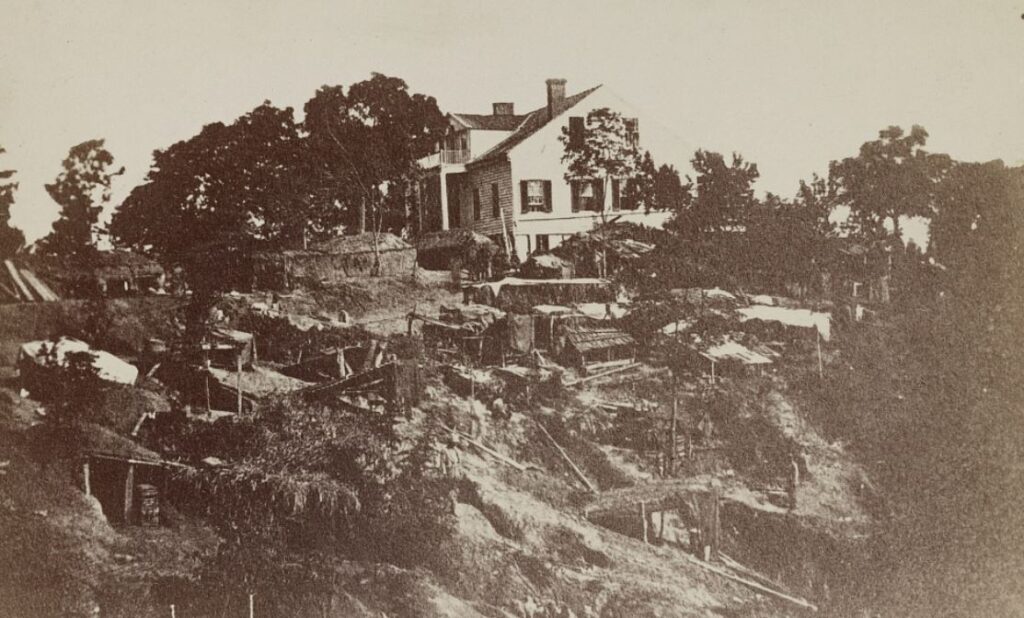
The momentum shift wasn’t a single battle, but a slow, relentless tightening of the noose around Vicksburg.
The relentless pressure, both physical and psychological, exposed the city’s vulnerabilities and ultimately led to the inevitable Confederate surrender on July 4th, 1863.
Strangled Supply Lines: With Vicksburg completely encircled, Confederate supply lines were severed. Food, medicine, and other essential supplies dwindled rapidly. Soldiers were put on half rations, and civilians faced food shortages. This lack of sustenance weakened the physical health of the defenders and significantly impacted their morale.
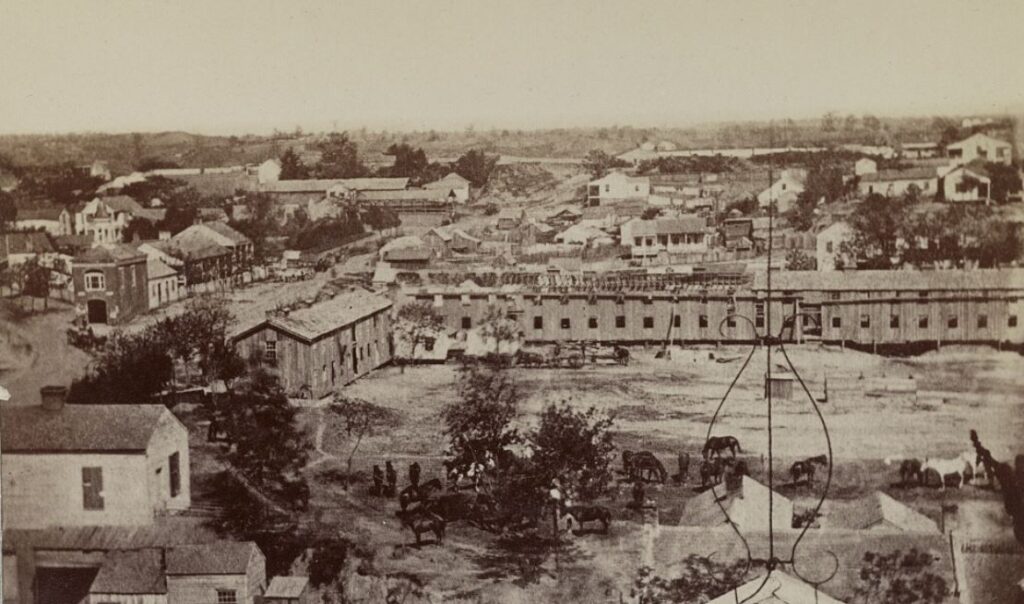
Living in Squalor: The siege forced a massive number of civilians – women, children, and the elderly – to take refuge within Vicksburg’s limited space.
Crowded conditions, combined with poor sanitation practices due to limited water availability, became a breeding ground for disease. Outbreaks of diseases like dysentery and measles spread rapidly, further straining limited medical resources and adding to the misery of those trapped within the city.
This hardship eroded the fighting spirit of the Confederate troops, making them more susceptible to despair and less willing to endure the prolonged siege.
7. The Confederate Surrender at Vicksburg
The relentless siege of Vicksburg finally reached its climax on July 4th, 1863.
Deteriorating Situation: By early July, the situation within Vicksburg had become untenable. Confederate forces were facing starvation, disease was rampant, and morale had plummeted. Lieutenant General John C. Pemberton, the Confederate commander, recognized the futility of continued resistance.
Initial Offers Rejected: On July 3rd, Pemberton sent a messenger to Union General Ulysses S. Grant requesting a truce to discuss surrender terms. Grant initially demanded an unconditional surrender, which Pemberton refused.
Grant’s Resolve: Grant, unwilling to risk a costly final assault, reconsidered his position overnight. He recognized the symbolic importance of capturing Vicksburg on Independence Day and offered more lenient terms.
These terms allowed for the Confederate soldiers to march out with their personal belongings but required them to parole themselves, meaning they could not take up arms against the Union for the remainder of the war.
White Flag Raised: On July 4th, Pemberton accepted Grant’s modified terms. A white flag of surrender was raised over Vicksburg, and Confederate soldiers began marching out of the city. The formal surrender ceremony took place a few days later.
The 47-day siege of Vicksburg remains one of the most brutal and significant battles of the Civil War. It showcased the brutality of trench warfare while highlighting the strategic importance of controlling the Mississippi River.
8. How Did the Siege of Vicksburg Affect the Overall Outcome of the Civil War?
Beyond the immediate tactical victory for the Union, the fall of Vicksburg had a profound impact on the overall course of the war.
Severing the Confederacy’s Lifeline: The Mississippi River
The Mississippi River was the Confederacy’s economic and logistical backbone.
By capturing Vicksburg, the Union achieved a critical strategic objective envisioned in the Anaconda Plan – splitting the Confederacy in two and crippling their ability to move resources efficiently.
This severed the eastern and western Confederate states, hindering communication and making it much harder for them to coordinate military operations. Western states like Texas and Arkansas, which had provided vital supplies and manpower to the Confederacy, were effectively isolated.
A Crippling Blow to the Confederate Economy
The Confederacy relied heavily on trade flowing up and down the Mississippi River. Cotton, their primary export, was transported down the river to ports for international trade, generating much-needed revenue to finance the war effort.
Capturing Vicksburg choked off this economic lifeline.
With control of the river, the Union could disrupt trade, cripple Confederate finances, and hinder their ability to purchase essential war materials from abroad.
This forced the Confederacy to rely more heavily on internal resources, straining their already limited supply chains and further weakening their war footing.
A Major Morale Booster for the Union
The Union Army had suffered significant losses in earlier battles, and public support for the war, particularly in the North, had begun to wane.
The capture of Vicksburg, a heavily fortified Confederate stronghold, provided a much-needed morale boost for the Union.
News of the victory spread like wildfire, reinvigorating the North’s belief in the Union cause. This renewed public support solidified the North’s commitment to the war effort and provided critical manpower and resources for future campaigns.
The Siege of Vicksburg undoubtedly influenced the 1864 presidential election.
The Confederacy’s defeat at Vicksburg weakened the arguments of the Democratic Party, whose platform included calls for peace negotiations. With the Union clearly gaining momentum, voters were less likely to support a candidate advocating for an end to the war before achieving victory.
Weakening Confederate Resolve
The fall of Vicksburg exposed the vulnerability of their western theater and highlighted the growing strength of the Union. Many Southerners, particularly those in the isolated western states, began to question the long-term viability of the Confederacy.
Strategic Repercussions for the Confederacy
The fall of Vicksburg had a significant impact on the Confederacy’s military strategies.
The loss of control over the Mississippi River forced them to redeploy troops to defend the remaining western transportation routes, weakening their forces in the eastern theater.
This opened opportunities for further Union advances in the crucial eastern battlefields like Virginia and Tennessee.
Furthermore, the Confederacy’s desperate need to regain control of the Mississippi River led to risky military maneuvers, such as General Robert E. Lee’s Gettysburg campaign.
This ultimately disastrous attempt to invade Pennsylvania was partly motivated by a desire to capture a major Northern city and force the Union to relinquish control of the Mississippi in exchange for peace. The eventual failure of Gettysburg further weakened the Confederacy and cemented the Union’s strategic advantage.
9. The Legacy of Vicksburg: A Turning Point in the War
The Siege of Vicksburg stands as a turning point in the Civil War.
The Union victory not only achieved a significant strategic objective but also had a profound impact on the morale and resolve of both sides.
For the Union, Vicksburg represented a major turning point, boosting their morale, solidifying public support, and paving the way for future victories that would ultimately lead to Confederate surrender in 1865.
While the Civil War continued for another two years after Vicksburg, the strategic and psychological ramifications of the siege significantly altered the course of the conflict.
It marked a critical moment when the tide of the war began to turn decisively in favor of the Union.
After this loss, the Confederacy, facing dwindling manpower and resource constraints, struggled to maintain effective resistance. Their focus shifted towards delaying tactics and defending remaining territory rather than achieving significant victories.
The Confederacy continued to resist for another two years, but they lacked the resources and momentum to achieve a significant strategic victory. The Union, on the other hand, gradually squeezed the Confederacy, culminating in their ultimate surrender in 1865.
10. Frequently Asked Questions about the Siege of Vicksburg
1. Why was the siege of Vicksburg a turning point in the Civil War?
The siege of Vicksburg was a turning point in the Civil War because it gave the Union control of the Mississippi River, splitting the Confederacy in two and cutting off vital supply lines.
2. How long did the siege of Vicksburg last?
The siege of Vicksburg began on May 18, 1863 and lasted for 47 days until July 4, 1863 when the Confederates surrendered.
3. What was the significance of the fall of Vicksburg?
The fall of Vicksburg gave the Union army control of the Mississippi River, effectively dividing the Confederate states and weakening their ability to wage war.
4. What role did General Ulysses S. Grant play in the siege of Vicksburg?
General Grant was the commanding Union general during the siege of Vicksburg and his strategic planning and leadership played a crucial role in the Union’s victory.
5. How did the siege of Vicksburg impact the outcome of the Civil War?
The siege of Vicksburg was a major turning point in the Civil War as it gave the Union a crucial advantage, leading to their eventual victory over the Confederacy.
After this loss, the Confederacy, facing dwindling manpower and resource constraints, struggled to maintain effective resistance.
6. What were some of the hardships faced by soldiers during the siege of Vicksburg?
Soldiers on both sides faced extreme heat, disease, and constant bombardment during the siege of Vicksburg, making it a difficult and grueling battle for both sides.
Further Heading
If you enjoyed this article, you may be interested to read more about the American Civil War events, or perhaps read about the South’s important victories. Read here for more general American history.

